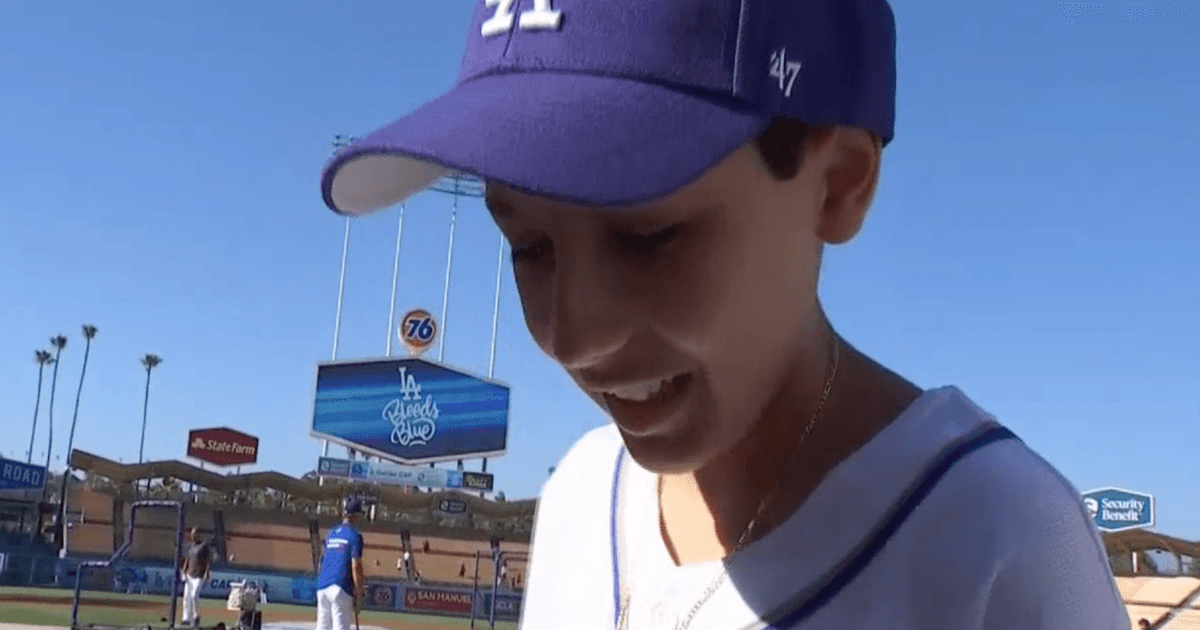When this little eleven-year-old from southern California was diagnosed with cancer, his life changed a lot, and one of the biggest changes was that he and his family couldn’t make it to the Dodgers baseball games, a family pastime. Now that he’s in remission, A.J. Dilatory got to celebrate his remission by announcing the famous opening lines at the Dodgers stadium, “It’s Time For Dodger Baseball.”
“It’s awesome,” he said when asked how he felt about the experience.
Read MoreRELATED: 8-Year-Old Boy With Brain Cancer Wished for Some Christmas Cards And Got Thousands
Doctors at Children’s Hospital were able to surgically remove 95 percent of the tumor, but that last five percent had entered into his brainstem, where it was too dangerous to remove it. He spent the next year in treatment to kill that last five percent, and doctors have now declared him in remission.
A.J. also watched as the team warmed up, practiced batting, tossed the ball around.
How do children with cancer get to have a dream come true?
If you know a child with cancer and want to make their dreams come true, there are a few organizations that do so every day. The biggest is the Make-A-Wish Foundation, which granted more than 15,400 wishes across the United States last year alone. You can refer a child for the make a wish foundation if the child has a critical illness, is over the age of 2½ and is younger than 18. After you refer the child, the foundation will work with physicians to determine whether they qualify for the program.
The Granted Wish Foundation is similar to the Make-A-Wish Foundation, but serves children ages 5-25.
The Dream Factory provides a similar service as an all-volunteer driven children's wish-granting organization that does not limit its mission to children who have life-threatening illness. Children must be between 3 and 18 years old to be eligible, and a doctor must affirm that the child has a chronic illness.
The Sunshine Foundation also focuses on wish granting, and it’s “sole purpose is to answer the dreams of chronically ill, seriously ill, physically challenged and abused children ages three to eighteen, whose families cannot fulfill their requests due to financial strain that the child's illness may cause.”
Information about childhood medulloblastoma
Medulloblastoma is a cancer of the central nervous system, meaning it begins in the brain or spinal cord. Medulloblastoma tumors are all classified as Grade IV tumors, meaning they are malignant (cancerous) and fast-growing.
Medulloblastoma can occur in both children and adults, but is more common in children, and a small percent of childhood medulloblastomas are related to inherited genetics.
The symptoms of medulloblastoma vary based on the location of the tumor. For patients with medulloblastoma in the cerebellum may have issues with walking, balance, and/or fine motor skills. It can also lead to increased pressure in the skull. As a result, the cancer may cause headaches, nausea, vomiting, blurred and double vision, extreme sleepiness, confusion, seizures and even passing out.
If the disease has spread to the spine, symptoms may include weakness or numbness in the arms and or legs, a change in normal bowel or bladder habits, and spinal pain.
Learn more about SurvivorNet's rigorous medical review process.


